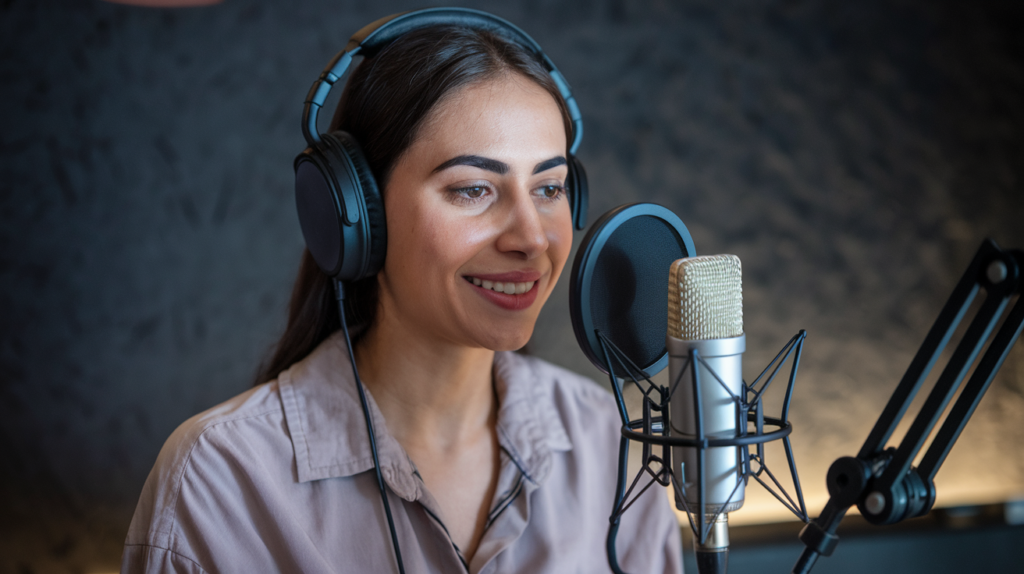Arabic voice over services are essential for reaching a diverse audience in the Middle East, North Africa, and Arabic-speaking communities worldwide. These services bridge the linguistic gap and provide culturally nuanced audio content for a variety of industries, including entertainment, education, marketing, and corporate communication. Below, we’ll explore the key aspects of Arabic voice over, including language, accents, and dialects.
What is Arabic Voice Over?
Arabic voice over refers to the process of recording spoken audio in Arabic for use in multimedia projects. This service often includes professional voice actors, sound engineers, and linguists to ensure the voice-over aligns with the project’s goals. It can be used for:
- Audiobooks
- Films and TV shows
- Corporate videos
- E-learning modules
- Advertising and marketing
The Importance of Professionalism in Arabic Voice Over
Given the complexity of the Arabic language and its cultural significance, high-quality voice over services are critical. Professional Arabic voice actors not only pronounce words correctly but also convey the right tone, style, and emotion.
Language in Arabic Voice Over
Arabic is one of the most widely spoken languages globally, with over 420 million speakers. However, the language’s structure and use vary significantly depending on the context.
Modern Standard Arabic (MSA)
- MSA is used for formal communication, such as news broadcasts, academic materials, and government content.
- It’s understood across the Arab world but is not commonly spoken in daily conversation.
- Ideal for projects targeting a broad Arabic-speaking audience.
Colloquial Arabic
- Colloquial Arabic refers to the regional dialects spoken in daily life.
- Unlike MSA, colloquial variations can differ dramatically from one country to another.
- Examples include Egyptian Arabic, Levantine Arabic, and Gulf Arabic.
Script and Pronunciation
- Arabic script reads from right to left and requires expertise to maintain flow in voice recordings.
- Pronunciation is crucial, as slight changes can alter the meaning of a word.
Accents in Arabic Voice Over
Arabic accents can influence how a message is perceived. Selecting the right accent can make or break the success of a voice-over project.
Neutral Arabic Accent
- Often a mix of MSA with minimal regional influence.
- Suitable for corporate or international projects where a neutral tone is required.
Regional Accents
- Egyptian Arabic: Known for its soft, melodic tone; popular in entertainment and advertising.
- Gulf Arabic: Used in the Gulf region, characterized by a distinct rhythm and pronunciation.
- Levantine Arabic: Covers Syria, Lebanon, Jordan, and Palestine; warm and relatable for regional audiences.
- Maghrebi Arabic: Spoken in North African countries like Morocco and Tunisia, with unique influences from Berber and French.
Dialects in Arabic Voice Over
Dialects play a significant role in localization. While MSA provides a universal base, incorporating specific dialects adds authenticity and emotional resonance.
Challenges in Dialects
- Dialectal differences can lead to misunderstandings if not handled carefully.
- Professional voice actors with expertise in a specific dialect are crucial for accuracy.
Matching Dialect to Audience
- For entertainment: Use regional dialects to build relatability.
- For education: Stick to MSA for clear and universally understandable communication.
- For marketing: Choose a dialect based on the target market’s location and preferences.
Applications of Arabic Voice Over Services
- Film and TV Dubbing: Adapting international content for Arabic-speaking viewers.
- E-learning: Localizing courses for diverse learners in Arabic-speaking countries.
- Advertising: Capturing the cultural nuances of Arabic-speaking consumers to enhance brand impact.
- Gaming: Providing immersive audio experiences for Arabic-speaking gamers.
Why Choose Professional Services?
Professional Arabic voice over providers bring a combination of linguistic expertise, technical skills, and cultural awareness to your project. This ensures:
- High-quality recordings
- Accurate representation of the language and culture
- Connection with the target audience
Arabic voice over services are more than just translations—they’re about connecting cultures and delivering impactful messages to Arabic-speaking audiences. With the right combination of language, accent, and dialect, your project can resonate deeply with this rich and diverse community.
You have not enough Humanizer words left. Upgrade your Surfer plan.







